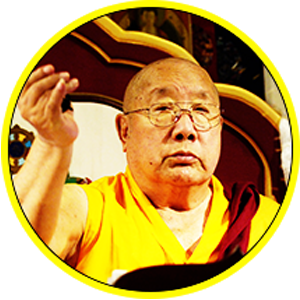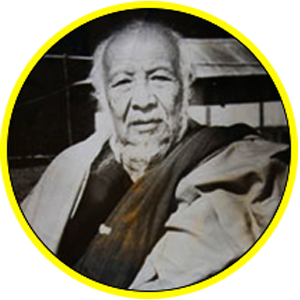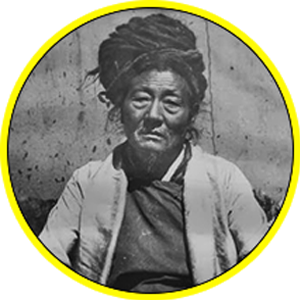Prophecy of the Birth
Dorje Phagmo Today
The current incarnation of Dorje Phagmo, Farchen Zangmo, was born in the village of Kabesa in Bhutan’s Punakha District, on the full moon of the second month of the year of the Iron Monkey (1980). Her biological parents were Tandin Gyeltshen and Lhachoe Droelma. Her birth was preceded by many auspicious signs, among them her mother saw in her dream a ray of light hit the womb. The light emanated from a golden statue of Dorje Phagmo, bestowed by a monk who was believed to be a manifestation of Guru Padmasambhava.
Dorje Phagmo was born in a forest, where her mother and two cousins had taken their cattle for grazing. Her birth was welcomed by rainbows encircling the Sun and illuminating the spot where the birth took place. On the same spot, her mother and cousins described a dharlam—white clouds resembling the path of a sacred ceremonial scarf—and a sprinkle of rain, which is considered highly auspicious. A nearby small pond where she was taken to be bathed turned a milky white.
At the moment of her birth, Dorje Phagmo was found to be clean, with peculiar birthmarks and imprints all over her body. Since no one could read or understand the imprints, the child was initially assumed to be a bad omen. Some concluded that the child might be a witch or an evil spirit who could bring misfortune upon their village. Villagers even warned her parents to dispose of the baby as soon as possible. Fortunately, Dorje Phagmo’s grandfather stood firm beside her and was resolute in her defense. As she grew up, Dorje Phagmo performed miracles, which amazed the villagers and eased their earlier apprehensions.
The first important moment in her life came when the caretaker of the Royal Stable shared the news of her birth and the young girl received an audience with the fourth king of Bhutan, Jigme Singye Wangchuck (r. 1972–2006). The king, upon seeing the unique imprints on her body, told the parents that the baby bore marks resembling that of Dorje Phagmo. The parents were commanded to take good care of the child and to maintain good hygiene. They also received a soelra (a special gift) from the monarch.
Pursuing The Call
When Dorje Phagmo was just 15 months old, she expressed the need to leave her biological parents and fulfill her prophesy. A teenage girl from the same village agreed to carry her to the capital, Thimphu, a place where neither had been before.
They set out from Kabesa for Thimphu on foot, a journey that requires crossing Sinchu La, a mountain pass some 3,300 meters above sea level and which normally takes two days. It has been said that the two girls were able to complete the passage in just four hours and that the guardian deities of Dorje Phagmo journeyed along with them and even carried them.
When the two children reached Langjukphakha in Thimphu, the elder girl did not know where to go. Dorje Phagmo, however, pointed to the opposite hill and asked her companion to head toward it. This is the location of the nunnery Zilukha Lhakhang, which was then under the guidance of the 16th Drubthob Thangthong Gyalpo Rekey Jadrel Rinpoche. The story also goes that a day earlier, Drubthob Rinpoche saw in a vision the arrival of Dorje Phagmo. The nuns of Zilukha Lhakhang had been ordered to arrange a ceremonial welcome for Dorje Phagmo. But rather than the expected religious figure accompanied by a retinue of attendants and disciples, they were astonished to see a young girl arrive bearing small baby.
Thereafter, Dorje Phagmo lived under the sacred care and protection of Drubthob Rinpoche and his consort Yum Dolkar at Zilukha Lhakhang. This became her first place of learning and Drubthob Rinpoche and Yum Dolkar were her first spiritual parents.
She received initial teachings in the Dharma, and blessings and empowerments from Drubthob Rinpoche himself. Although her identity was kept a secret, many people and especially great Buddhist masters from Bhutan, India, Nepal, and Tibet visited her after having visions and revelations of her birth. Drubthob Rinpoche named her Farchen Zangmo (Farchen: Transcendental; Zangmo: Lady of Auspiciousness).
When Dorje Phagmo was two years old, Drubthob Rinpoche passed away. Two years later, Drubthob Rinpoche’s consort, Yum Dolkar, departed Zilukha Lhakhang and thereafter Dorje Phagmo lived through a series of difficulties.
Some 18 months later, she traveled to Darjeeling in India. She was not yet six years old. There she received transmissions and studied at Sonada Gompa under Kalu Rinpoche (1905–89) for about a year. Kalu Rinpoche was a close friend of Drubthob Rinpoche and had presided over the consecration of Zilukha Lhakhang. From Darjeeling, Dorje Phagmo was taken to Nepal, where she remained for about a year, receiving further teachings from various lamas.
At the age of eight, Dorje Phagmo was brought back to Zilukha Lhakhang at the request of some of the nuns, who retained a strong sense of devotion toward her. However, she would remain in Thimphu for just five months; on the advice of Druktruel Ngawang Khenrab and Ayang Rinpoche, she was sent to Mysore in India in 1988 to study under His Holiness Pema Norbu (known as Penor Rinpoche; 1932–2009). For 12 years thereafter, Dorje Phagmo studied at Namdroling Monastery and received every teaching and empowerment from Penor Rinpoche, who also recognized her as a true incarnation of Dorje Phagmo.
During her studies in Mysore, Dorje Phagmo was diagnosed with a form of blood cancer. The medical prognosis was not favorable: she was not expected live longer than a few months. The illness brought with it a nightmare of difficulties, witnessed by a few attendant devotees at Changidaphu (Kala Bazaar), Thimphu. Today we are all fortunate that the cancer prognosis and medical tests have proven to be incorrect.
In 2000, after completing her studies, Dorje Phagmo returned to Bhutan to spend two years in solitary retreat at Paro Tashi Chhoeling Monastery.
Today, Dorje Phagmo Rinpoche continues her work spreading the Dharma, spending much of her time at her monastery in Zhemgang District, with occasional visits to Thimphu to raise the necessary resources and to meet with visitors and followers.
Since returning to Bhutan, Dorje Phagmo Rinpoche has revealed and discovered numerous ter (sacred treasures), and is said to have manifested several miracles in person, such as leaving her hand and footprints on rocks, pebbles, and wooden floors, and spending nights alone practicing in places such as Buli Tsho (Buli Lake), and helping people recover from chronic illnesses. Many of her devotees have witnessed these events in person, and all of these people are living and can testify to their experiences.






















